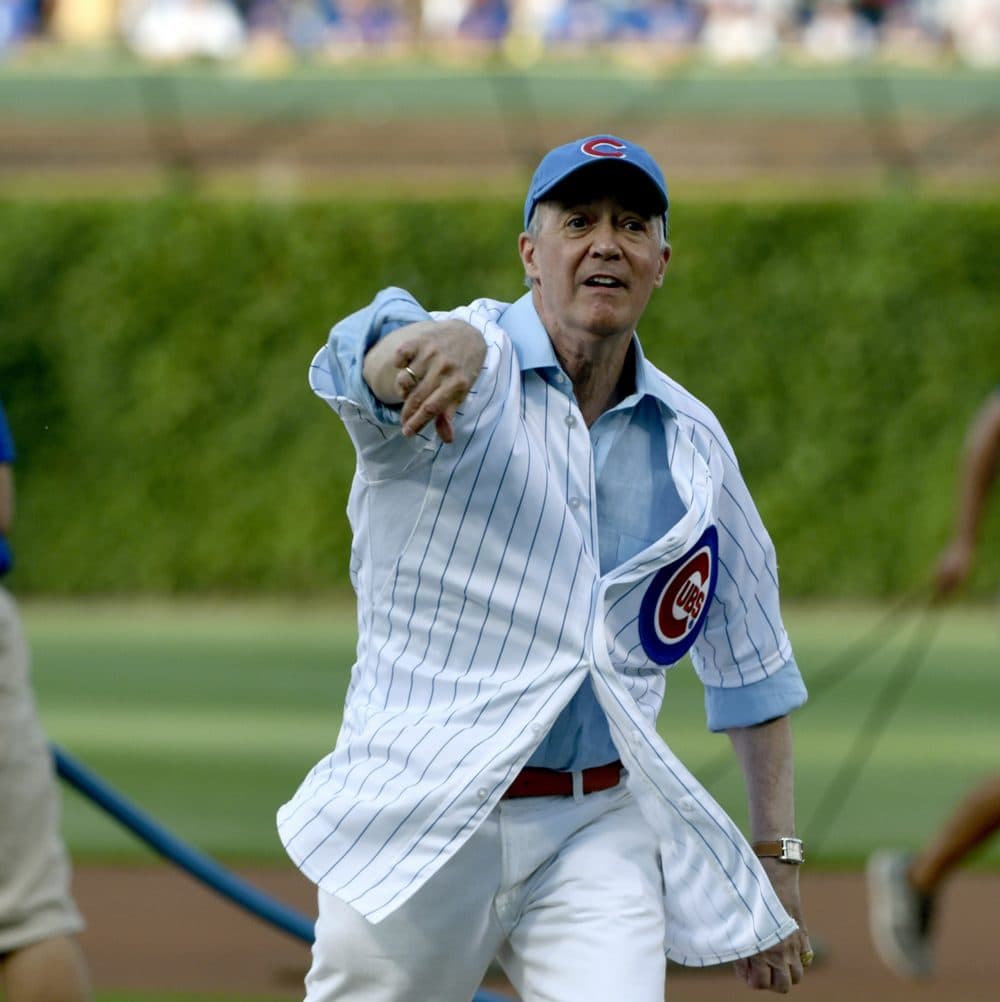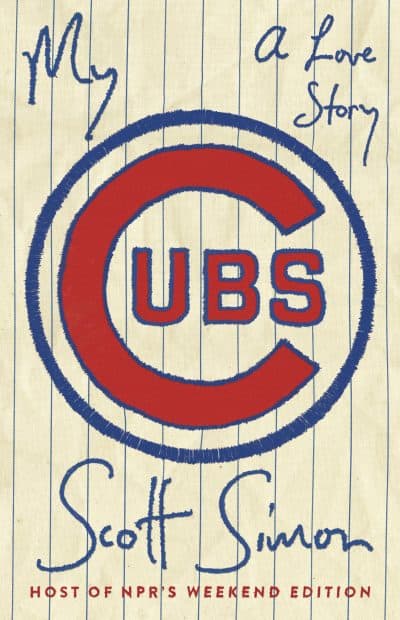Advertisement
Scott Simon On Life With The Cubs And The Manager Who Cursed Out Chicago
Resume
Until Aug. 8, 1988, the Chicago Cubs played all their home games in daylight.
That meant that on a spring afternoon, when children came home from school on the elevated train that ran by Wrigley Field ...
"Very often the 'W' or the 'L' flag would be raised right in front of the L platform as we passed the Addison Street Station, so we could see if the Cubs won or lost," says Scott Simon, host of NPR's Weekend Edition Saturday. "And, of course, I don’t have to say, usually it was the 'L' flag."
Born Into Fandom
Simon began paying attention to those flags and the Cubs as a child. He didn’t have much choice.
"My godfather was Jack Brickhouse, who was the Chicago Cubs announcer for many years," he says. "He was the guy who actually preceded Harry Caray. And his home run chant is still very famous in Chicago: 'Back, back ... that’s it ... hey, hey!'
"He taught me that if you were going to be a Cubs fan, you had to accept their history. You couldn’t count on them winning. You couldn’t even count on them improving. But what you could count on was the fact that you could have a great day at the park."
Out of necessity, that became the marketing campaign for the Cubs. Come on out to this beautiful ballpark, enjoy a hot dog and a cold beer in the sunshine. And for decades, each new stadium built by a ball club somewhere else made Wrigley Field seem more charming, no matter the quality of the home team.
"People would go to Wrigley Field and they would be almost oblivious to what the score on the field was," Simon says. "They would turn around and go, 'Oh, I guess we’re behind again.' But that didn't mean they wouldn’t get 3 million people into the park every year."
Well, maybe not quite 3 million. But that camaraderie and incidental baseball defined the experience of the Cubs fan. And everybody was happy with that, right?
'Those Are The Fans He's Talking About'
You could argue that until the afternoon of April 29, 1983. As the day dawned, there was no reason to anticipate that change was imminent at Wrigley. Certainly there was nothing different about the home team.
"Oh, they were terrible," Simon says. "They had begun the season — they lost 14 games and they'd won only five. And the day on which you’re speaking, they had lost to the Los Angeles Dodgers 4-3. You know, close game as these things go. And as the team was walking in from the field, Lee Elia, their manager, heard boos from the stands. So by the time that he actually reached the locker room, he was on full boil."
(Note: The video below contains explicit language.)
"They're really, really behind you around here — my f---in' ass," Elia said during his postgame press conference..
"Those are the fans. These are us he’s talking about, Bill," Simon says.
Elia went on to slam Cubs fans for being at the ballpark in the middle of the day.
"Eighty-five percent of the f---ing world’s working," Elia said. "The other 15 come out here."
"Was Lee Elia the sort of manager inclined to speak that way?" I ask.
"Well, like a lot of managers, he spoke baseball," Simon says. "He actually just used one profanity over and over again. It’s not like he had a whole host."
Lots of managers lose their tempers and unleash lots of epithets. Or the same epithet over and over. Whatever. But Elia’s outrage wouldn’t have made sense anywhere but in Wrigley Field. It was the only Major League park where you could only see a game while everybody with a job was at work.
And Elia’s characterization of people watching from the stands as unemployable nabobs and ne’r-do-wells, well, you have to wonder, don’t you, if there was any excuse for it.
"What you see when you kind of read between the lines, is that he was being very loyal to his players," Simon explains. "He was defending them from what he thought were the nudnik fans who were booing them."
"The fact that it was so outrageous underscored the fact that there’s something about this franchise that just wasn’t the same like other franchises."
Scott Simon
The Cubs arranged a radio interview, where Elia would apologize.
"Uncle Jack was still the team announcer then," Simon says. "Lee Elia made a full apology and said, 'I don’t know what got into me. I’m really sorry. We have the greatest fans in the world here in Chicago, and I can’t believe that I insulted them.'
"And he and Uncle Jack went out for a drink afterward. And Uncle Jack said that he just looked across at him and said, 'Forgive me, what the f--- were you thinking?' And Lee Elia said, 'I don’t know what got into me.' And he was let go as manager of the Cubs within a few weeks."
So Lee Elia was gone, but not forgotten. He’d added a grand story to the legend of the Cubs. His tirade was the sort of event that causes people of a certain sort to remember where they were when they heard it, and how they reacted.
"I couldn’t stop laughing," Simon says. "There was just something so fundamentally charming about it. I wasn’t outraged. I didn’t feel that as a fan I had been affronted. The fact that it was so outrageous underscored the fact that there’s something about this franchise that just wasn’t the same like other franchises."
For most fans, the broadcast apology was the end of that particular Cubs story. But not for Scott Simon. After Lee Elia left the bar and went home on the night of that fateful outburst, Simon got the debrief from his customary source.
"So Uncle Jack and I talked at about 10:30, 10:45," he says. "And I remember, I said to him something like, 'Do you think fans are going to show up at the ballpark?' And he said, 'Are you kidding me? I think fans are going to be moved to show up more than ever.'"
Breaking The Curse
The Cubs drew 1.5 million fans in '83, and half a million more than that the following season. And throughout the '80s and the '90s and into the 21st century, the Cubs continued to be the Cubs. That is, they continued to avoid the World Series, perhaps concerned that if they got there, they might win. And that would change everything. Because you cannot be a loveable loser if you win.
And then, last summer and fall, the Cubs turned their back on the hard-earned image based on curses, errors, bad trades, bad luck and, of course, Lee Elia’s peppery attack on the paying customers.

They won. And it changed everything for their fans, right? It had to, at least for one public radio host who’d always counted on the Cubs when he’d made autumn fundraising appearances at NPR affiliates.
"I would begin by saying, 'You know, I’m kind of astonished to see that here we are in October, and they’re still playing baseball. Did you know that? As a Cubs fan, I thought the season ended in September,'" Simon says. "I can’t use that material now, can I? I can no longer say, 'I don’t follow professional sports. I’m a Cubs fan.'"
Right. That material doesn’t work anymore. But what Cubs fan mourns the loss? Not Scott Simon.
"The whole idea that the Chicago Cubs had won the World Series," he says, "not only is that a notion that had really never occurred to me for most of my life. Not in my father’s life, who is now gone. Not in my grandfather’s life. This was just not an event that I ever thought I would see."
Read more about Scott Simon's long history with the cubs in his book "My Cubs: A Love Story."
This segment aired on April 8, 2017.



